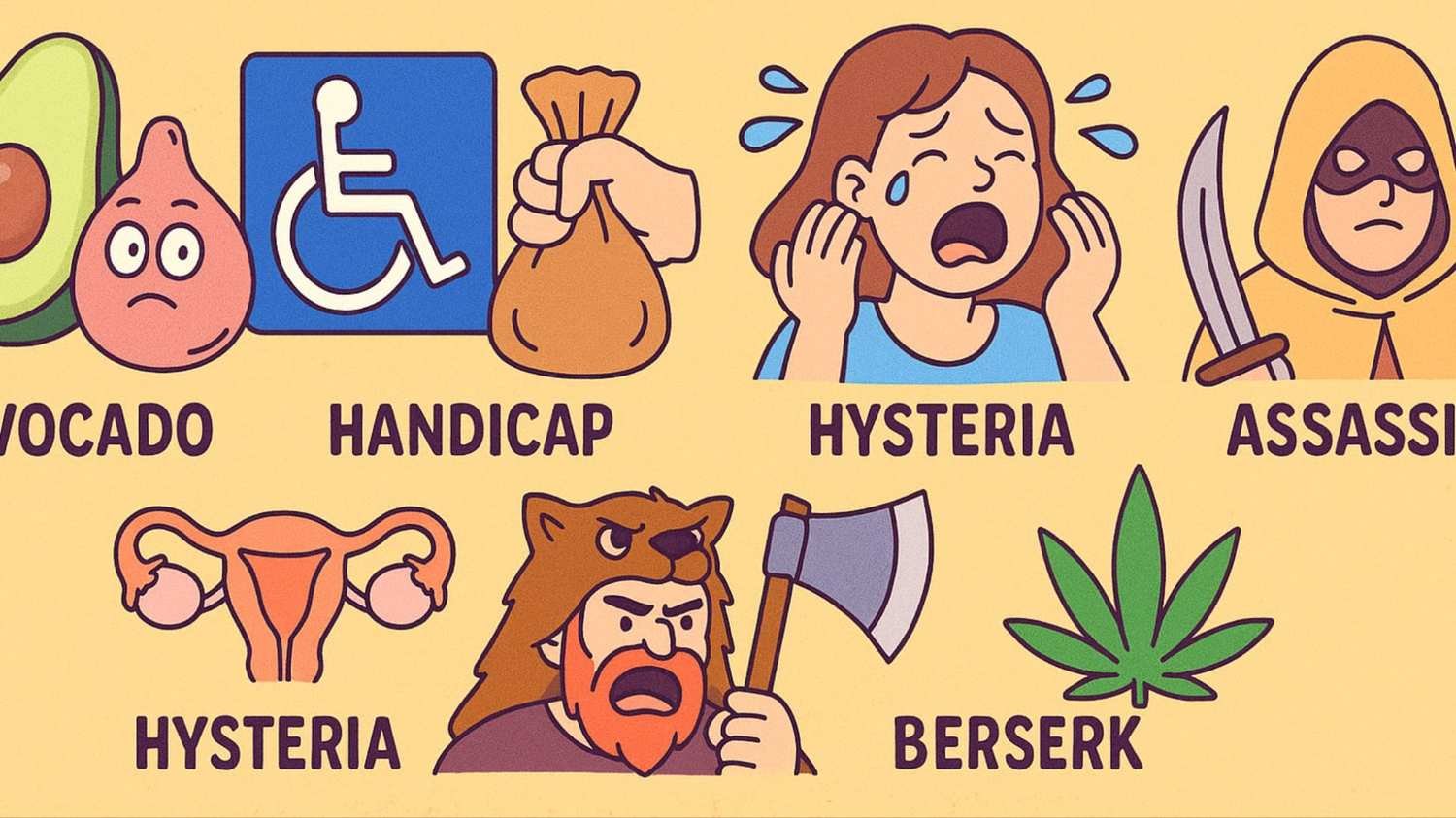The Hidden Histories Behind Everyday Language
Language evolves in fascinating ways, carrying stories from ancient civilizations, bizarre customs, and forgotten beliefs. Many words that roll off our tongues today have origins that would surprise even the most seasoned word enthusiasts. These linguistic treasures hide tales of warriors, medical misconceptions, and cultural practices that seem almost fictional.
How Ordinary Words Became Extraordinary Stories
The transformation of language over centuries shows how human society shapes communication. Words that once carried shocking or taboo meanings gradually softened into everyday vocabulary. Meanwhile, others retained their power while gaining new contexts. This linguistic evolution reveals how cultures adapt, forget, and reinterpret their past through the very words they speak.
Here are five innocent-sounding words with wild backstories that will change how you think about everyday language.
1. Avocado
From Ancient Anatomy to Breakfast Toast
The word “avocado” traces back to the Nahuatl language of the Aztecs, where “ahuacatl” referred to this green fruit. However, the original meaning wasn’t nearly as innocent as today’s superfood status suggests.
The Shocking Etymology Behind This Green Fruit
Ancient Aztecs named the avocado after male reproductive organs due to the fruit’s distinctive shape and the way it hangs in pairs from trees. The resemblance was so striking that “ahuacatl” became the standard term for both the anatomical feature and the fruit. Spanish conquistadors, perhaps feeling uncomfortable with the original meaning, transformed it into “aguacate” and eventually “avocado.”
Modern Transformation into Millennial Gold
Today’s avocado obsession would probably amuse the ancient Aztecs. This once-scandalously named fruit now graces everything from toast to smoothies, earning the nickname “green gold” for its nutritional value and cultural status. Social media has elevated avocados to symbol status, representing healthy living and trendy cuisine, completely divorced from its risqué origins.
2. Handicap
Medieval Gambling Games and Modern Misunderstandings
The term “handicap” emerged from a 17th-century English trading game called “hand-in-cap.” Players would place money in a cap, and an umpire would determine fair exchanges between items of different values. The practice involved equalizing advantages to create fair competition.
Gaming Origins That Shaped Language
Originally, handicapping meant creating balance in games and sports by giving advantages to weaker players or disadvantages to stronger ones. Horse racing adopted this concept, adding weight to faster horses to level the playing field. The word had nothing to do with physical limitations or disabilities in its early usage.
Contemporary Usage and Sensitivity
Modern language has largely moved away from using “handicap” to describe people with disabilities, recognizing the term’s gaming origins and potential insensitivity. Instead, “disability” or “accessible” language has become preferred. However, the word persists in sports contexts, maintaining its original meaning of equalizing competition through strategic advantages or disadvantages.
3. Hysteria
Ancient Medical Myths and Gender Bias
“Hysteria” comes from the Greek word “hystera,” meaning uterus. Ancient Greek and Roman physicians believed that women’s emotional and physical ailments stemmed from a “wandering womb” that traveled throughout the body, causing various symptoms and irrational behavior.
The Absurd Medical Theory That Defined Women
For over 2,000 years, medical professionals attributed women’s health issues to hysteria, dismissing legitimate concerns as feminine weakness. Treatments ranged from bizarre to dangerous, including marriage prescriptions, avoiding education, and various invasive procedures. This pseudoscientific concept reinforced gender stereotypes and prevented proper medical care for countless women.
Breaking Free from Historical Baggage
Modern medicine has completely debunked hysteria as a legitimate diagnosis, recognizing it as a product of historical sexism rather than scientific fact. Today, healthcare professionals understand that symptoms once labeled as “hysterical” often indicate real medical conditions requiring proper treatment. The word now appears mainly in historical contexts or as a general term for extreme emotional reactions.
4. Berserk
Viking Warriors and Battle Fury
“Berserk” originates from Old Norse “berserkr,” combining “ber” (bear) and “serkr” (shirt or skin). These legendary Viking warriors wore bear pelts into battle and were famous for their uncontrollable rage and fearlessness in combat.
The Wild Warriors Who Defined Madness
Berserkers supposedly entered trance-like states before battle, becoming immune to pain and fear while displaying superhuman strength. Some historians suggest they used psychoactive substances or practiced specific rituals to achieve these altered states. Their reputation for frenzied fighting made them both feared enemies and valuable allies in medieval Scandinavia.
From Ancient Battlefields to Modern Slang
Contemporary usage of “berserk” describes anyone acting wildly or losing control, though thankfully without the violent battlefield context. The word has found new life in popular culture, from anime titles to describing everything from malfunctioning technology to enthusiastic sports fans. Its evolution shows how words can maintain their emotional intensity while adapting to peaceful contexts.
5. Assassin
Secret Societies and Political Murder
The word “assassin” derives from “hashshashin,” Arabic for “hashish users.” This term referred to members of a secretive Islamic sect active during the Crusades, known for carrying out political murders against enemies of their leader, Hassan-i Sabbah.
The Mysterious Cult Behind Political Killing
The Nizari Ismailis, labeled as “hashshashin” by their enemies, operated from mountain fortresses in Persia and Syria. Whether they actually used hashish remains debated among historians, but the name stuck. Their targeted killings of political and religious figures made them legendary throughout the medieval world, inspiring fear and fascination in equal measure.
Evolution into Modern Terminology
Today’s usage of “assassin” has expanded beyond its historical origins to describe any person who kills for political reasons or payment. The word appears frequently in entertainment, from video games to spy novels, often romanticizing what was originally a feared religious and political phenomenon. Its journey from specific historical sect to general term shows how language adapts to describe timeless human behaviors.
The Lasting Power of Linguistic Evolution
These five words demonstrate how language carries forward the DNA of human history, preserving ancient customs, beliefs, and practices in unexpected ways. Each time we use these terms, we unconsciously connect with civilizations, conflicts, and cultural practices that shaped our ancestors’ daily lives.

